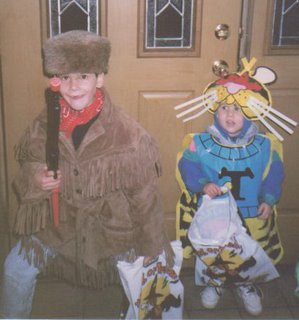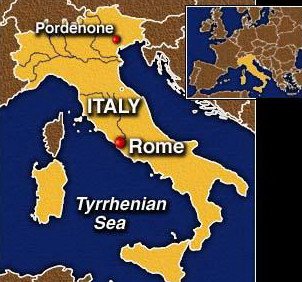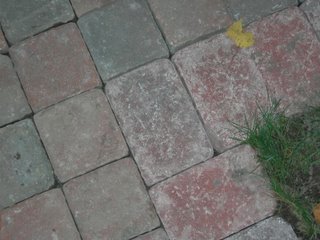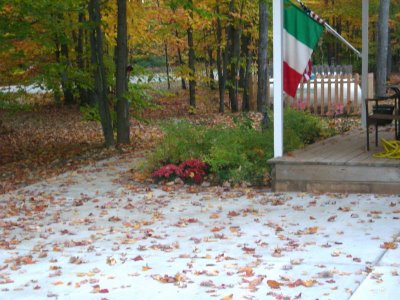U.S. Constitution Amendment 1 - Freedom of Religion, Press, Expression
Congress shall make no law respecting an establishment of religion, or prohibiting the free exercise thereof; or abridging the freedom of speech, or of the press; or the right of the people peaceably to assemble, and to petition the Government for a redress of grievances.
It is often said that one of the rights protected by the 1st Amendment is the freedom of expression. This site, in fact, uses that term in its quick description of the amendment: "Freedom of Religion, Press, Expression." But "expression" is not used in the amendment at all. This term has come to be used as a shorthand, a term of art, for three of the freedoms that are explicitly protected: speech, petition, and assembly. While the use of "freedom of expression" is ubiquitous in this area of 1st Amendment study, it is important to note exactly what "freedom of expression" refers to - let this be such a note.
Yoko Ono on John Lennon and the FBI
John Lennon's Widow Talks With Jonathan Karl About Their 'Threat' to U.S. Government
By JONATHAN KARL ABC News
Sept. 5, 2006 — - John Lennon's perceived "threat" to the U.S. government is the highlight of a new film that documents his transformation from pop idol to political activist and offers a fresh look at this former Beatle's career.
"The U.S. vs. John Lennon" will be released later this month. Yoko Ono cooperated with the filmmakers, opening her archives of rarely seen footage of the couple's fight for peace.
"One thing that brought us together was the fact that both of us were rebels in so many ways," she said.
And that's something he didn't always share with his bandmates, who were reluctant to join Lennon as he spoke out against the Vietnam War, said Ono. "He is the only one who really wanted to do something about it when he was a Beatle," Ono explained.
Star Watched by the FBI
Lennon's rebelliousness may have come at a price. In the 1970s, Lennon was convinced that government agents were watching him. As it turns out, he was right.
Almost 20 years after his death, the government released the FBI file on Lennon, which included nearly 300 pages of text. One document that went from the FBI to the CIA reports that Lennon planned to take part in a protest at the 1972 Republican National Convention.
South Carolina Sen. Strom Thurmond seized on that, suggesting to President Nixon's attorney general that Lennon's visa be terminated.
A few weeks later, Lennon was given 30 days to leave the country and was notified that his visa had been terminated because of an old drug arrest in England.
"I think that the world really loved the Beatles for being charming and sweet," Ono said. "But some people did resent the fact that they were no more the sweet, nice, charming boys."
Ono and Lennon did not want to leave the United States, and a legal battle ensued.
In 1976, after the end of the Vietnam War and the Watergate scandal, Lennon won.
The judge in the case wrote that the British singer's battle to stay in the United States was a "testimony to his faith in the American dream."
A letter from Yoko Ono Lennon
GIVE PEACE A CHANCE
From the very first moment John and I saw each other, we knew something was about to happen - something big. We just didn't know how big. When John and I sang "Give Peace A Chance" from our Bed- In in Montreal, we had no idea the song would become an anthem not only for our time but for generations to come. It went around the world, and made other songwriters realize that you can convey political messages with songs. Millions of people got together and joined in its chorus. Singing it together made us all realize that we were a power strong enough to change the world. Little did we know that that's when we, John and I, really made our beds for life.
Both of us experienced World War II from two opposite sides. We knew what it meant to be in the war. We knew how, suddenly, you could lose everything. We knew that people like us were the ones who really suffered, and the Generals and the politicians just kept dishing out lies to keep us pacified. That was an insult to kids like us. Two angry people. That's what we were. So when we met and hugged each other, our back bones literally relaxed. Let's change the world for the better together. YES! Never in a million years, did we think that promoting World Peace could be dangerous.
Were we naive? Yes, on that account, we were. John sings on the CD: "Nobody told me there'd be days like these." That was his true confession. "Gimme Some Truth," another song in this collection, is a song only John could write and sing. It's a John Lennon Special born out of that unmistakable Liverpool attitude. Nobody would ever write a song like this and sing it the way John did.
The songs in this collection aren't just about peace; they also focus on issues of social injustice that were so important to us back then, like "Attica State." John was inspired to voice the injustice in the world he saw. He did it quickly just like the editorials of daily papers. What's fascinating to me is how these songs, taken from the original albums and used as score for the film, are given a whole new life. "I Don't Want To Be A Soldier Mama" and "Here We Go Again," tragically speak to life in our 21st Century. These songs have become relevant all over again. It's almost as if John wrote them for what we are going through now.
The filmmakers have chosen his best songs: powerful and insightful. There are the political slogans, "Give Peace a Chance" and "Power to the People" as well as the deep and tender songs like "Love," "Scared" and "Beautiful Boy" - songs from his heart that still touch us today.
Watching this film triggers in me memories of wonderful times, frightening moments, great victories and the final heartbreak - the moment the world stopped for me - and for so many people around the globe. At its heart is a story of a man who was driven to make a better world for all of us. I believe John would have loved this film. It's not tabloid, but rather it tells it like it was. "Gimme Some Truth," indeed.
I'll say no more. The songs speak for themselves. By listening to them, you will get the energy and power of a guy who believed in what he wrote, lived to sing them and died at the prime of his life as a singer/songwriter.
It is with great pride that along with my filmmaker friends at Authorized Pictures (David Leaf & John Scheinfeld), Lionsgate Films and EMI that I present the soundtrack to this important film, "The U.S. Vs. John Lennon."
War is Over (If You Want It) - Yoko Ono Lennon - Summer of 2006
Product Details Soundtrack to "The U.S. Vs. John Lennon":
The U.S. vs. John Lennon [SOUNDTRACK] Audio CD
Original Release Date: September 26, 2006
Number of Discs: 1
Format: Soundtrack
Label: Capitol
 Risa and Bobby's Pumpkins - 2006
Risa and Bobby's Pumpkins - 2006
 Frankenstein slowly approached, dragging his legs, without saying a word. All you could hear was the dragging and clunking noise from his boots.
Frankenstein slowly approached, dragging his legs, without saying a word. All you could hear was the dragging and clunking noise from his boots. 















 Pordenone Links
Pordenone Links














